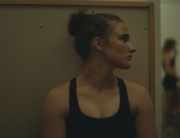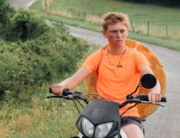
A teenage girl runs down a road, looking behind her back as if she’s escaping or running away before someone. Both are partially true. Rosina (Romina Betancur) wants to avoid responsibility after she has done something terrible, and her father finally reaches her on a beach, where she runs into the water. Joaquin (Fabián Arenillas) calls for her to come back to the shore, looking concerned and resigned. The girl doesn’t obey immediately, and after coming out of the water, she spots a fleeting sight of a fin among the waves—it might be a shark. This evocative introduction, full of auguries and questions to answer, is an alluring starting point before sailing onto quieter waters where patience is mandatory.
The reason why Rosina ran was because she just had a violent fight with her older sister, Mariana (Antonella Aquistapache), whose eye was so badly injured that she had to wear a patch. It’s never entirely clear the severity of the injury or why the fight started in the first place. Like many elements in this movie, everything that happens allows us to understand Rosina bit by bit.
As for her discovery on the beach, no one in her family gives her enough credit to believe her, not even when she explains eloquently the differences between sharks or dolphins. She is part of a household entirely absorbed with individual tribulations (economic difficulties, future plans, and work) to care for the trivialities of the middle child of three siblings.
However, when people in the town hear rumors about the presence of sharks at sea, they congregate on the beach to decide what to do since it’s a tourist destination. Many of them want to listen to the testimony of Rosina, but she speaks with doubts and nervous indifference, not so confident after all. Uruguayan filmmaker Lucía Garibaldi, marking her feature film debut, delves into the inner world of this 14-year-old girl and her contradictions as Rosina tries to define herself and what she believes in in opposition to others.
Rosina’s unruly and has a tendency to withdraw from others. With her mother, Mercedes (Valerie Lois), there is always a misunderstanding in their conversations, especially when Rosina explains her opinions about subjects like veganism or animal rights. Around other girls like her sister and friends, she keeps distance from the provocative talk about boys and sex. She seems determined to counter any traditional model of femininity as a form of a private rebellion.
She has a better relationship with her father, who hires her to work temporally for him and his maintenance crew. Teenager Joselo (Federico Morosini), one of her co-workers, draws Rosina’s attention and is sexually attracted to her, in a clumsy and unsubtle way. This is something entirely new for Rosina, who is curious enough to accept his invitation to visit him at his garage in the middle of the night.
What happens next is a sex scene in which the script bypasses two obvious choices (a dangerous situation for Rosina or an erotic awakening) and portrays an awkward situation instead. (She remains deadpan watching and listening to the boy masturbate on his own while he demands her to “touch yourself.”) After this unsatisfactory experience, he acts coolly and detached afterwards, and she feels darker emotions because of his rejection that she never verbalizes but acts on instead, looking for ways to hurt Joselo, like using an anonymous phone number to only breathe when he speaks or, more ominously, kidnapping his pregnant dog.
The Sharks presents a realistic and frank representation of female adolescence, without judging Rosina or reflecting her life from an omniscient perspective. If the film ends up feeling disjointed and anti-climactic in relation to plotlines that could have been developed front and center (the hunt for sharks among the townspeople, the disappearance and return of the dog), it’s because all those big dramatic resolutions are too gimmicky compared to Rosina’s angst and her absorbing selfishness. This is not a typical coming-of-age story about an incomplete childlike person learning an important lesson. Garibaldi is fully aware that growing up is a messy and an arbitrary process that surpasses any “sense” we pretend to make of it.
















Leave A Comment